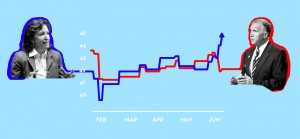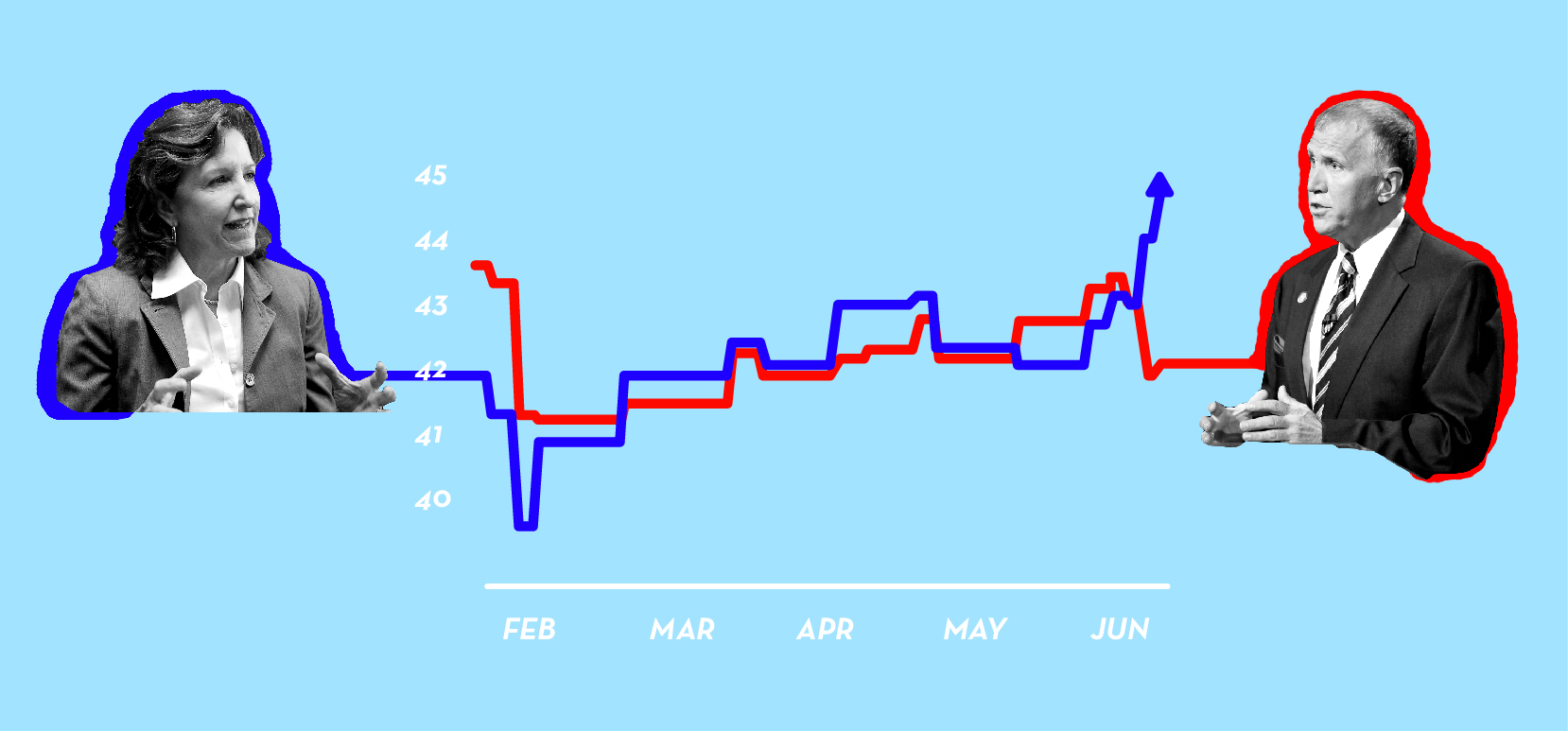
On a recent visit to my former high school in Charlotte, North Carolina, I asked my 12th grade English teacher, Kristen Ohaver, what she thought of the Republican-controlled state government. A devout Catholic and steadfast Republican, she is the teacher supervisor of the Young Republicans club at the school. “I hate it,” she said, smiling at the irony of her statement. “In fact, I’m planning to vote for Kay Hagan this fall. And I might tell my Young Republicans to do the same.”
My teacher’s unexpected response comes just months before the US Senate’s general elections. In North Carolina, first-term, Democratic incumbent Hagan will attempt to fend off a challenge from Republican Thom Tillis, the Speaker of the NC House of Representatives since 2011. With control of the US Senate hanging in the balance, special interest groups, the media and both national parties have taken a keen interest in North Carolina’s impending partisan conflict. But for North Carolinians, this race counts for much more than senatorial arithmetic. In fact, the state’s future seems to be hanging in the balance.
In 2012, North Carolina elected Republican Pat McCrory as Governor, and for the first time in over 140 years, Republicans had a firm grip on both, state house and governor’s mansion. The GOP held a majority in the General Assembly since 2010, making McCrory’s victory a triumphant affirmation of the party’s agenda. Victory came in large part thanks to McCrory’s strong performance in the state’s two most populous counties, Mecklenburg and Wake, where President Obama earned 60 percent and 55 percent of the vote, respectively. Republicans heralded the election as the dawn of a new era for North Carolina–one in which they finally had free reign to overturn what they saw as decades of failed Democratic legislation.
Last July, The New York Times took stock of the Republicans’ historic mandate, publishing a scathing editorial decrying “The Decline of North Carolina.” Among other reforms, the NC General Assembly had ended federal benefits for the unemployed, cut education spending and instituted voter ID requirements. Giving voice to the state’s beleaguered liberals, the editorial board concluded, “North Carolina was once considered a beacon of farsightedness in the South, an exception in a region of poor education, intolerance and tightfistedness. In a few short months, Republicans have begun to dismantle a reputation that took years to build.”
But attempts by Governor McCrory to take back some of the state’s recent legislation have exposed rifts within North Carolina’s Republican administration. On June 25, Speaker Tillis and Governor McCrory unveiled a spending bill to address one of the most pressing issues in the state: education. The legislation would increase teacher pay by five percent, allow teacher assistants to keep their jobs, set aside more money for textbooks, maintain tenure for current teachers and reinstate bonuses for teachers with master’s degrees. However, the bill put forth by McCrory and Tillis comes at a tense time in the General Assembly, as it goes up against a State Senate bill that would raise teacher compensation by 11 percent while eliminating thousands of teacher assistant jobs. When asked about the sparring proposals, my former English teacher said, “This in-fighting does little to bolster support for the party or an actual resolution for the issues. I find it deeply concerning as a taxpayer, parent and teacher. They not only lost my respect; they lost my vote.” But she is not the only one disillusioned with the current state of affairs. Last October, another NC Republican changed allegiance in a very public way. Jason Thigpen, an army veteran running for US Congress as a Republican, told the Raleigh News & Observer that he would be joining the Democratic Party, saying, “I didn’t go to war to defend the liberties and freedoms of one party, race or one income class of Americans.” If the words of two onetime stalwarts of the Republican party are any indication, party politics have become a liability for Tillis, who introduced his education legislation precisely with the hope of recapturing my teacher’s vote and the votes of others like her.
Although the proposed education measures are a change from the General Assembly’s small government stance, Tillis has otherwise stood by his record as Speaker. In a recent interview with the Guardian, he proudly announced, “We have had a conservative revolution in this state. Whether it’s cutting taxes, cutting spending, cutting regulations, medical malpractice reform or election law and voter ID.” His campaign website’s biography reads like a cross section of the national Republican platform. Tillis emphasizes the Republican state legislature’s tax cuts, balanced budgets and repeals of social programs implemented by previous governments, writing that he “and his House colleagues have pushed a ban on gay marriage, pro-life protection laws and required drug testing for welfare recipients,” in addition to jettisoning “the pro-abortion state policies Democrats had put in place for decades.” Though he may have made token efforts to indicate otherwise, Tillis clearly believes that rather than negatively impacting his chances in the November election, the policies that provoked the wrath of The New York Times will win over North Carolina’s voters.
Discerning public opinion of Tillis’s platform is no easy task. A survey by the Democratic-leaning Public Policy Polling (PPP) found the Speaker’s approval rating to be just 23 percent, two points higher than an April poll by Elon University. Even more tellingly, North Carolina residents’ approval rating of the General Assembly was just 18 percent, according to PPP, and 27 percent according to Elon University. Although that’s a dismal starting point for a first-time senatorial candidate, Kay Hagan’s approval rating of 35 percent can hardly be reassuring for the incumbent. At a time when just a quarter of Americans believe the country is moving in the right direction, it is difficult to pin down the precise source of voters’ discontent in the murk of bipartisan dissatisfaction. However, in what must come as some consolation to Tillis, the Elon University poll revealed that less than one fifth of those who had an unfavorable opinion of him blamed his legislative record as the immediate cause.
Similarly, Tillis’s able performance in the May 6 GOP primary suggests that among North Carolina Republicans, his well of support remains deep. Tillis received more than 45 percent of the vote, comfortably passing the 40 percent required to avoid a runoff and easily quelling challenges from his even more conservative opponents, Greg Brannon and Mark Harris, who earned 27.1 percent and 17.5 percent of the vote, respectively. In an April 22 debate, the Tea Party-backed Brannon positioned himself to Tillis’s right on issues such as health care, education and gun rights; Harris, a Baptist pastor, hoped to win over the state’s religious right, even organizing a grassroots movement through North Carolina’s many Baptist churches. In a primary season wracked by internal conflict, Tillis’s convincing victory over Brannon and Harris was widely considered to be another confirmation of the establishment’s dominance within the GOP. While being far from unanimous, the State House Speaker’s strong performance suggests that the Tillis campaign’s decision to stand by his track record played well in the eyes of Republican North Carolinians.
Whether or not that tactic will carry Tillis to Washington in November has everything to do with Kay Hagan. One of the greatest obstacles to Senator Hagan’s reelection is her connection to President Obama and, more specifically, the Affordable Care Act — also known as Obamacare — which has proven to be divisive among NC voters, among many others. On his campaign website, Tillis calls Obamacare “a cancer on our national economy.” Far from standing her ground, Hagan’s website makes no reference to Obamacare. While some may criticize her disloyalty, the Elon University poll seems to vindicate her stance. Nearly half of those surveyed said that they were less likely to vote for her knowing that she had voted in favor of the Affordable Care Act, compared to just over a third who said they were more likely to vote for her because of it.
Senator Hagan is hoping to cast herself as the moderate while avoiding explicit connections to President Obama. Hagan has largely sought to steer clear of any potential controversy, focusing instead on a platform of broad, middle-of-the-road issues. Agriculture, education, jobs and the economy, military and veterans, seniors, women and families stand atop her agenda. Conspicuously absent are hot-button topics such as abortion and gay marriage, which have become sticking points for many voters. By relying on such a tame agenda (especially in comparison to that of Speaker Tillis), Senator Hagan is hoping to cast herself as the moderate while avoiding explicit connections to President Obama, an association for which the Tillis campaign and Republican PACs have repeatedly attacked her. Ironically, Hagan’s 2008 victory over Republican predecessor Elizabeth Dole was possible, in part, due to the latter’s ties to the ailing Bush administration.
Like Tillis, Hagan will have the support of her party’s base, which has been vocal in its opposition to the state government’s policies. In addition to the DNC machine, which has begun gearing up for battle all across the nation, Moral Mondays, an intersectional protest movement founded in 2012 in direct response to the election of Pat McCrory, aims to put pressure on the state government to change policies that are, according to the protesters, unjust and immoral. Drawing from supporters of voting rights and social welfare programs as well as environmental and pro-choice advocates, the grassroots organization has mobilized thousands of NC residents against the state’s Republican administration. Moral Mondays can measure their success in their opposition, as the NC General Assembly has recently attempted to limit protests in the state Legislative Building. This is no doubt welcome news for Hagan, who will certainly need an energized and organized base if she is to defend her seat, particularly if Tillis reclaims the disappointed Tea Party voters, who have proven themselves a grassroots force to be reckoned with.
If anything is certain about this year’s US Senate race in North Carolina, it is that it will be a bitter fight to the end for the Republican establishment in Raleigh and its supporters. A Tillis win would validate the conservative agenda and serve as a strong rebuke to the liberal establishment. For teachers, minorities and all those who feel marginalized by the state government, a Hagan loss would feel catastrophic. Ultimately, despite the focus on the Democratic and Republican candidates, it could all come down to simply how many votes Libertarian candidate Sean Haugh takes off Tillis. While North Carolina has become emblematic of the increasingly rancorous divide that persists throughout the nation, it is easy to forget that for many, the result of this election is not merely an ideological proving ground, but an all too personal judgment on their healthcare, or their children’s education or their employment prospects. Just as we cannot afford to lose sight of the bigger picture, we cannot afford to forget that this year’s midterm election is not only about control of the Senate, but also about whether schools will be able to afford the teaching assistants their children desperately need. Beneath the din of partisan drama, elections are about people and the future they hope to create.

Excellent review of NC politics. Clear and insightful.